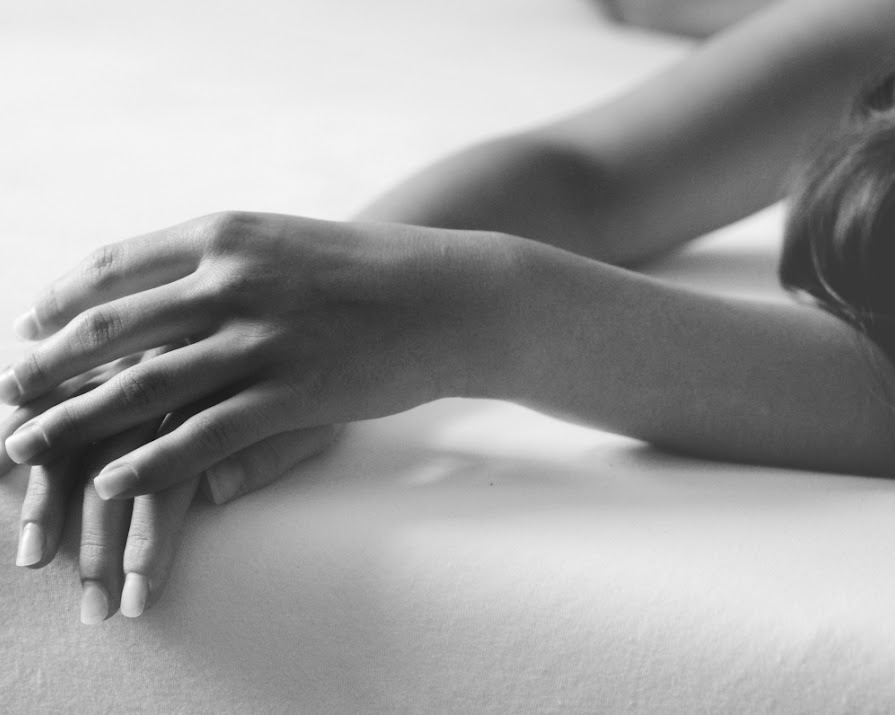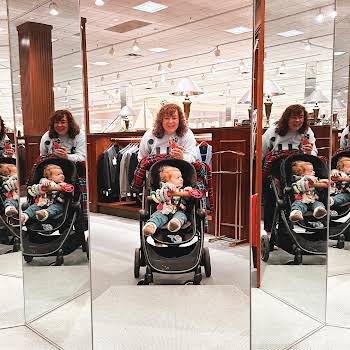By Sophie White
10th Sep 2018
10th Sep 2018
The week that Claire was due her first baby, her mother died suddenly.
“We buried her on the Thursday and I went into labour the next day.”
“As my sister said, we’re up all night, our mother’s just died and we’re throwing a party,” says Claire recalling the surreal days before her baby, Theo arrived.
The birth was traumatic, long and gruelling, and eventually the baby was delivered, in distress, by c-section and transferred to the neonatal unit. Unable to hold her baby, Claire was given a private room and spent the initial days, until Theo was well enough to leave, receiving visitors with no baby to show them.
“It was so hard. I was really down and really upset and the midwives got a counsellor to come and speak to me. He said: ‘just look after yourself and you’ll be fine’ and I really obeyed that and felt well for weeks until Christmas.” The holiday period was hard as the family struggled to come to terms with the loss of their mother and with the new year came further pressure for Claire and her husband when Claire’s mother-in-law needed to have surgery.
Feeling increasingly isolated, Claire was beginning to struggle.
“I tried to tell one of my sisters that I was feeling sad – in reality I was hopeless and empty – suggesting that maybe the birth and death so close together had been too much for me. She said ‘it was hard for all of us’. I took this as ‘cop on, get over it’. In reality, she probably meant ‘it was hard for all of us, even those who didn’t lose their mother before becoming a mother for the first time, don’t be so hard on yourself’.”
By February, Claire was unable to sleep even when her baby was peaceful beside her and her anxiety was hitting a peak. They went to the GP.
“He’s a lovely, lovely man but he just didn’t get it. He was like ‘you’re fine! You’ve a lovely husband! You’re a professional!’ He gave me antidepressants which I was uncomfortable about but his hands were tied as to what he could give me because I was still breastfeeding. And then he arranged a referral to the home-based treatment team. And I went in to see a couple of psychiatric nurses but I think I wasn’t totally open with them about how awful I felt.”
Crisis point
The following weekend events reached crisis point.
“I had stopped breastfeeding because I thought my supply had gone and I felt like my baby didn’t need me anymore. It all sounds crazy now looking back, of course it does. I had started taking the antidepressants… and I felt a bit out of it. That was probably the lack of sleep. My husband said ‘why don’t you go to the spare room and try and get some sleep?’ So I went in there.”
At some point during the night, Claire tried to take her own life.
“It sounds awful and people are so shocked by it. My husband found me in the spare room. I don’t really remember this but he rang an ambulance. I vaguely remember the ambulance being there, they were very kind. The guards came.”
“I’ve rarely seen my husband cry. I remember sitting in the hospital with doctors stitching me up, I’d lost a lot of blood and he was crying beside me.”
“I think he was upset that I didn’t tell him how awful I felt but I think I’d just gone too far at that stage.”
After a blood transfusion, Claire was moved to the acute mental health unit.
“There’s a lack of funding in the mental health services so some of the people there had been there for months or in and out for years and I asked the psychiatrist ‘Am I going to live here now? Is this just me now?’ She was great, she got me home on day release and then home for good shortly after.”
A home-based treatment team of psychiatric nurses and doctors called to the house daily but in the aftermath of her suicide attempt, Claire felt ambivalent.
“I didn’t feel delighted to be alive… over the next nine months there were very bad periods but I never tried to kill myself again. I did think about it but I just knew that it wasn’t an option.”
Self-compassion
Claire today is a confident and assured woman. Despite the traumatic events she is relating, she is funny and warm, however the Claire of the weeks after the attempt was a very different person.
“Looking back, I see myself curled up in a ball shaking not able to do anything and there’s another me, the normal me looking down in disgust and kicking me. I had no self-compassion. The guilt was so awful. I felt so guilty about my baby, my husband, my family – they had just lost their mother as well and here I was just adding to the problem.”
“My psychiatrist said what you’re going through right now will not affect your son, he won’t remember these dark days but if you had killed yourself and he grew up without a mother that would have a longterm effect. That really spoke to me, it made me realise he really is better off with me.”
“I had no history of mental illness and I thought once you were in the psychiatric services that was you for the rest of your life. So it discourages you from going to get help because you’d rather not be in that box.”
“I think I had an element of secondary depression as I was so stigmatised by what had happened.” The couple made the decision to keep the suicide attempt from certain members of the family. “This was decided for their protection, but it only served to confirm to me that what had happened was not just private, but shameful.”
“I remember my GP saying something like ‘you’re lucky, you have your mortgage and your mortgage cover because it’s very hard to get life assurance if you’ve had a history of mental health problems and certainly a suicide attempt’. I wouldn’t bet on that person myself!” Claire concedes laughing slightly. “It’s terrible.”
Over the following months, Claire recovered with the help of medication and her team and even returned to work just four months after being hospitalised.
“My psychologist felt I had my mother on a pedestal and in a way the postnatal depression developed from me thinking, ‘my mother reared eight of us why can’t I cope with one?'”
“I think it stemmed from me not grieving. I went from my mother dying into having a baby and tried to not grieve at all. It’s only since the beginning of this year that I’ve made my peace with my mother dying.”
“I feel emotional about her but I don’t feel depressed about her anymore. Crying about someone who has died who you loved is very different to depression, it’s normal. Whereas for me my depression was a numbness.”
Recovery
“The medication lets you cope with life, but I’m off all the meds now and I’m much more in touch with myself. Now, I try to prioritise myself. I don’t put pressure on myself to do more than I can do. My recovery was all about time. A nervous breakdown is a massive reset, and when you’re finally ready to reboot there’s a lot of crap that’s gone.
“Ever since I’ve tried to be as open as I can. I’m now well enough to be supportive of someone else. I have two or three friends who I don’t think would’ve admitted there was anything wrong. I can text them and there’s no shame.
“There are a lot of bad stories out there but I think it’s good to hear that someone recovered. I remember thinking ‘will I ever get my life back?’ You will feel normal again. My relationship is normal again, you know it’s back to normal when you’re arguing about little things and he’s not tiptoeing around you thinking ‘I’d better not upset her or she’ll try to kill herself again’. I thought it would follow me around for the rest of my life. I tried to give up, I couldn’t cop with the idea of being a burden on anyone.”
“When you’ve been through depression and life is just normal, the good bits seem amazing. I feel like I’ve never been happier. It’s weird. I feel I have renewed empathy. I understand people now.”
“I think the most remarkable thing is that I’m not ready to have another child just yet but I think we will have more children and I think I’ll have a much healthier attitude to everything the next time.”
If you are affected by any of the issues in this story, visit www.Pieta.ie






















